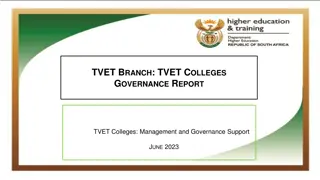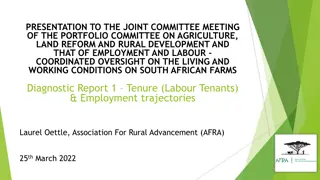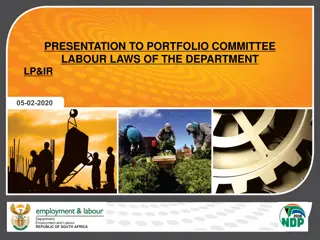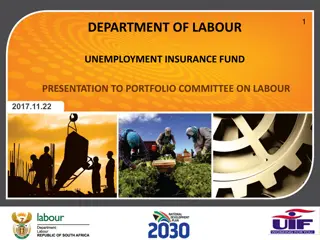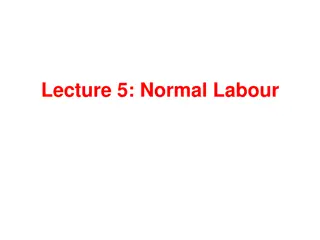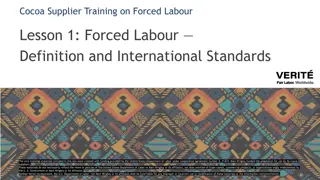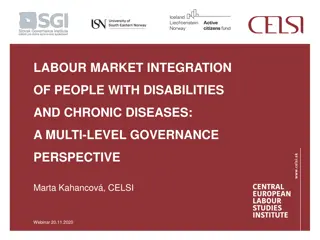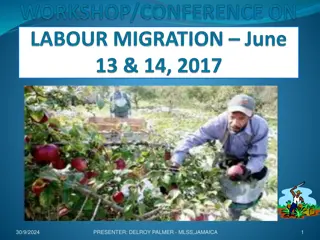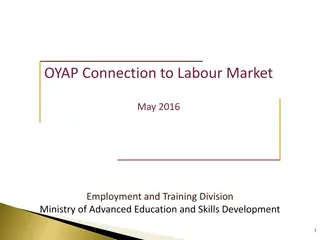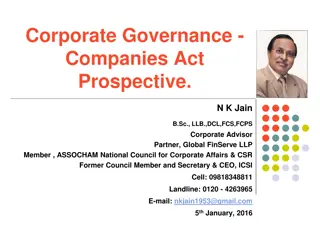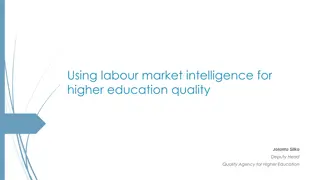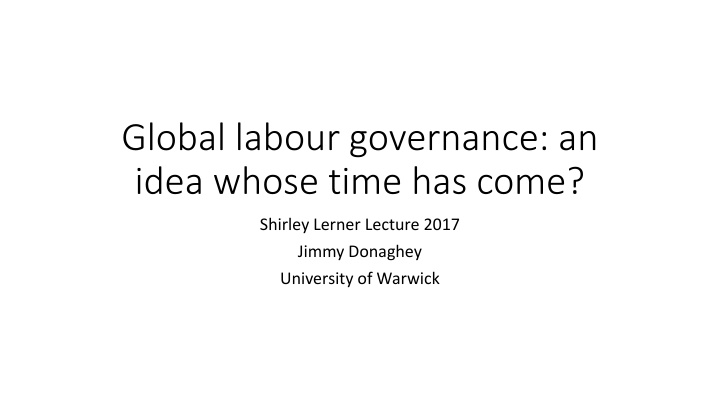
Global Labour Governance: An Idea Whose Time Has Come?
Contextualizing the necessity of global labour governance in regulating MNCs and their supply chains, addressing challenges, exploring the paradox of private labour governance, and delving into potential solutions.
Download Presentation

Please find below an Image/Link to download the presentation.
The content on the website is provided AS IS for your information and personal use only. It may not be sold, licensed, or shared on other websites without obtaining consent from the author. If you encounter any issues during the download, it is possible that the publisher has removed the file from their server.
You are allowed to download the files provided on this website for personal or commercial use, subject to the condition that they are used lawfully. All files are the property of their respective owners.
The content on the website is provided AS IS for your information and personal use only. It may not be sold, licensed, or shared on other websites without obtaining consent from the author.
E N D
Presentation Transcript
Global labour governance: an idea whose time has come? Shirley Lerner Lecture 2017 Jimmy Donaghey University of Warwick
Overview Context of global labour governance The paradox of private labour governance Approaches to transnational labour governance Case study: the response to the Rana Plaza disaster Unresolved questions of global labour governance Conclusions
Context of global labour governance Series of (low impact) public government initiatives to regulate MNC employment activities OECD Guidelines on MNCs UN Global Compact ILO Guidelines on MNCs All non-binding and advisory in nature Emergence of (private) global labour governance Three approaches in literature GVCs/GPNs Main focus on interfirm linkages Industrial relations approach Comparison of IFAs and Codes of Conduct Corporate Social Responsibility Power relations in private labour governance
Why is global labour governance necessary? Global labour governance generally viewed as the regulation of MNCs and their supply chains across borders Workers Low labour standards Western Brands Downward competitive pressures Substantial risks Spreading financial risk can increase reputational risk
Challenges in developing Global Labour Governance Low levels of unionisation and worker representation in many developing economies Lack of independent unions in others No coherent and meaningful sanctions available at intergovernmental level Western Buyer Brands engaged in downwards spiral in standards Interbrand competition Inter-supplier competition State incentives not to raise standards Low standard model as development Who enforces governance initiatives?
The paradox of global labour governance MNCs seeking regimes with low labour cost and low labour standards with lack of meaningful government oversight develop private governance regimes Two contrasting approaches Industrial relations versus Corporate Social Responsibility CSR approach sees brands as relatively benign actor that acts as enforcer Focus will be on the development of an experiment in the IR approach which has some strong elements of CSR
The response to the Rana Plaza disaster Bangladesh Ready Made Garment sector bedevilled by a series of deadly accidents 23rdApril 2013- Collapse of Rana Plaza, more than 1100 workers killed Factories producing sub-contracted goods for western brands Emergence of two initiatives Bangladesh Accord for Building and Fire Safety Collective agreement approach Alliance for Worker Safety in Bangladesh CSR approach Both programmes to run until 2018
A complex governance challenge Low structural power of workers Fragmented supply chain at each end; international competition Low associational power 97% factories completely non-union + union fragmentation lack of solidarity along the chain low/Workers covered by different GUFs IFAs with buyers (eg H&M, Inditex) could not be extended High mobilising capacity amongst NGOs ( voice ) to create reputation risk against brands Workers Rights Consortium and Clean Clothes Campaign high level of on the ground knowledge
Creating the Bangladesh Accord for Building and Fire Safety A series of factory collapses & fires (2005 Spectrum, 64 dead; 2012 Tazreen, 112 dead; 2013 Rana Plaza > 1,100 dead) Campaign by Workers Rights Consortium and Clean Clothes Campaign unions, leads to the MoU following Tazreen Needed four signatory companies $500,000 contribution required from each company April 2013 only two had signed up (Tschibo and PVH) Union involvement limited to two Bangladeshi unions Simultaneously a CSR based agreement being concluded under the Global Social Compliance Program
End of April 2013, IndustriAll became heavily involved and helped mould the MoU into Accord The Labour Caucus IndustriAll Uni Global Clean Clothes Campaign Workers Rights Consortium International Labor Rights Forum Maquila Solidarity Network Momentum led to the Accord Labour Caucus set May 15thdeadline for companies to sign Very quickly 50+ brands had signed up
What makes the Accord experimental? Agreement now between 200+ Brands, two Global Union Federations, Four NGOs as Witness signatories No seat for Bangladeshi employers or government Commitment to maintain purchasing from Bangladesh at inflation adjusted volume Covers 3 areas of safety- Building, Fire and electrical Firms pay annual contribution of up to $500,000 p.a for Accord governance & factory inspections in Bangladesh Governing body chaired by ILO And legally enforceable in the home country of the signatory companies
Rationale behind the Accord 5-year commitment we re not going to cut and run out of Bangladesh (brand rep) Rana Plaza as a problem of worker disempowerment and lack of voice rather than just poor infrastructure Focus on industrial relations institution building & worker capacity Commitment to set up democratically elected OSH committees in each factory Brands making commitments on cost of remediation and worker compensation Broad commitment Detail later
Implementing the Accord: Worker compensation Labour-negotiation approach Accord text requires brands to ensure compensation for 6 months if temporarily shut 4 months if permanent Brands to ensure : but who actually pays? Which Brand takes responsibility? Heavy involvement of IndustriALL/WRC in negotiations In minority of cases, process viewed as slow and cumbersome Local union capacity building
Developing institutions Collective, elected Occupational Safety and Health committees in agreement Union or Elected representatives Aspiration to develop voice to prevent issues arising Delays to labour law Increase in unions, albeit from low base 112 437 3% 5% Accord focussed first on 70 unionised factories Clause unlikely to be implemented everywhere but not collapsing Accord
Lesson drawing for global labour governance Building institutions versus solving problems Time perspective Role of brands as enforcer Relative autonomy of brands Collective role of brands, not atomised actors Role of the state States suppressing labour rights as part of their strategy Coalition of the weak can become strong Need for complementary capacities Democratic participation Unions working with or against NGOs Building Solidarities between workers and consumers Reputational damage key leverage but a precarious tool
Conclusions Global labour governance is at a very early stage of development Significant degree of policy experimentation likely However, new experiments in transnational governance emerging Bangladesh Accord ACT Important new dynamics emerging Shift in roles of actors NGOs, Brands, GUFs Power relations differ greatly These initiatives do however raise questions around democratic credentials
Work upon which the lecture is based Donaghey, J. and Reinecke, J. (2017) "When industrial democracy meets corporate social responsibility a comparison of the Bangladesh Accord and Alliance as responses to the Rana Plaza disaster", British Journal of Industrial Relations (published today) Reinecke, J. and Donaghey, J. (2015) "After Rana Plaza : building coalitional power for labour rights between unions and (consumption-based) social movement organisations", Organization, 22, 5, 720-740 Donaghey, J., Reinecke, J., Niforou, C. and Lawson, B. (2014) "From employment relations to consumption relations : balancing labor governance in global supply chains", Human Resource Management, 53, 2, 229-252

